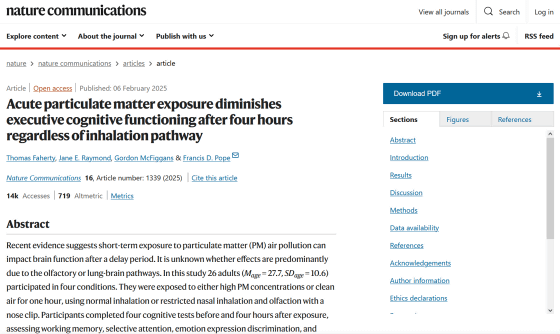People who are exposed to air pollution even for a short time have difficulty concentrating and understanding other people's emotions.

Air pollution is known to have
Acute particulate matter exposure diminishes executive cognitive functioning after four hours regardless of inhalation pathway | Nature Communications
https://www.nature.com/articles/s41467-025-56508-3

Air pollution clouds the mind and makes everyday tasks challenging | ScienceDaily
https://www.sciencedaily.com/releases/2025/02/250206113509.htm
Air pollution reduces people's ability to focus on everyday tasks, study finds | Air pollution | The Guardian
https://www.theguardian.com/environment/2025/feb/06/air-pollution-affects-peoples-ability-to-focus-on-everyday-tasks-study-finds
A research team from the University of Birmingham and the University of Manchester in the UK conducted an experiment to investigate how short-term exposure to air pollution affects cognitive function.
The experiment involved 26 subjects, who were asked to take a cognitive test, breathe air under specific conditions for one hour, wait four hours, and then take the cognitive test again. The sessions were repeated four times over a four-day period.
The subjects were asked to breathe either clean air or air contaminated with PM emitted from a burning candle. They were asked to breathe normally or through their mouths using a nose clip. A total of four different sessions were conducted using a combination of these two types of air.

The results showed that subjects exposed to polluted air performed worse in the executive functions of selective attention and emotional expression discrimination, regardless of whether they inhaled the air through both their nose and mouth or just their mouth.
Selective attention is the ability to keep your attention focused on something else while you're doing a task. 'Participants exposed to air pollution were less able to avoid distracting information,' said lead author Dr Thomas Faherty of the University of Birmingham.
'Emotion discrimination,' on the other hand, is the ability to read one's own and others' emotions. In this experiment, this was measured by a task of reading facial expressions displayed on a screen. 'Participants exposed to air pollution were worse at recognizing whether a face was fearful or happy. This may have implications for how we behave towards others,' Faherty said.
Previous studies have shown that worsening air pollution is correlated with increases in violent crime. Given the results of this study, it is possible that exposure to air pollution makes it harder for people to read other people's emotions, which in turn leads to more provocative behavior, which in turn leads to violent crime.
Research shows worsening air pollution correlates with increased violent crime - GIGAZINE

The study did not show any association between air pollution and working memory or other conditions, and suggests that some brain functions may be more resilient to short-term air pollution than others.
Professor Francis Pope, from the University of Birmingham and co-author of the paper, said: 'Poor air quality impairs intellectual development and worker productivity, which has significant social and economic implications in a high-tech world that relies on strong cognitive abilities. Reduced productivity also affects economic growth, so stronger air quality regulations and public health measures are urgently needed to counter the negative effects of air pollution on brain health, particularly in highly polluted urban areas.'
Related Posts:
in Science, Posted by log1h_ik







